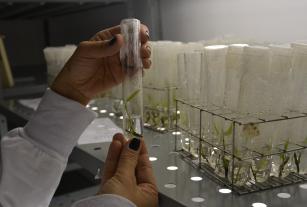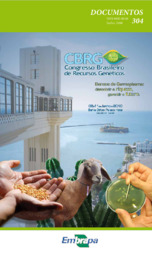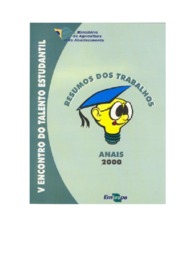Embrapa investe na diversificação dos métodos de conservação de espécies industriais para garantir a integridade do material genético conservado
Embrapa investe na diversificação dos métodos de conservação de espécies industriais para garantir a integridade do material genético conservado

Foto: GONÇALVES, Diva da Conceição
Embrapa investe na diversificação dos métodos de conservação de espécies industriais para garantir a integridade do material genético conservado
O agronegócio é um dos pilares da economia brasileira e uma parte considerável do superávit da balança comercial alcançado nos últimos anos se deve às exportações de produtos agrícolas. A lista de produtos é bastante longa, mas algumas espécies se destacam pela alta demanda e alta produção, como por exemplo, a soja, o café e a cana-de-açúcar.
A alta produção se deve, em grande parte, a utilização de genótipos superiores resultantes de melhoramento genético. O melhoramento genético é uma atividade que tem que ser realizada constantemente uma vez que a demanda por novos genótipos também é constante devido a diferentes motivos como, por exemplo, migração de pragas e doenças e expansão da cultura para novas áreas, como é o caso da cana-de-açúcar cuja área de expansão apresenta séria deficiência hídrica, demandando genótipos tolerantes a esse tipo de estresse.
Para que as demandas sejam atendidas, isto é, para que novos genótipos com as características desejadas sejam obtidos, é imprescindível que alelos envolvidos na expressão de características de interesse estejam disponíveis nos pools gênicos das espécies cultivadas. A disponibilidade desses alelos depende de uma adequada conservação do germoplasma disponível.
A conservação do germoplasma de espécies de grande importância para a indústria brasileira, como café, cacau, cana, dendê e seringueira, por diferentes motivos (sementes recalcitrantes, necessidade de conservação de determinados genótipos altamente heterozigóticos), tem sido realizada na forma ex situ com plantas mantidas a campo. Este tipo de conservação apresenta algumas desvantagens como o alto custo de manutenção, pois para algumas espécies a área ocupada é considerável, além de estar sujeita ao risco de perda da coleção ou parte dela por ataque de pragas, doenças ou devido a intempéries climáticas.
Este projeto tem como objetivo desenvolver técnicas e metodologias de conservação que permitam conhecer melhor essas coleções e, assim, identificar práticas mais adequadas de manejo em prol da sua manutenção e enriquecimento. Um dos benefícios esperados é a diminuição de custos por meio da redução do número de indivíduos através da identificação e eliminação de duplicatas, criação de coleções-núcleo e introdução de acessos ainda não existentes.
O melhor conhecimento das coleções contribuirá ainda para o direcionamento do processo de caracterização dos acessos, pois a partir da determinação do grau de caracterização, estudos poderão ser direcionados e priorizados mais eficientemente para preencher as lacunas, aumentando assim a utilidade dessas coleções no melhoramento genético de espécies tão importantes para a economia nacional.
O presente projeto pretende investir em métodos de conservação, como a manutenção in vitro ou a criopreservação, para apoiar a conservação ex situ a campo, de forma a garantir a integridade de todos os genótipos das coleções. A conservação in vitro pode ser utilizada tanto para as plantas que possuem sementes recalcitrantes quanto para aquelas altamente heterozigotas e cuja segregação é indesejável, como é o caso da cana-de-açúcar. Já a criopreservaçao é um método que pode ser utilizado para sementes de comportamento intermediário, como as do café, ou recalcitrantes. Ambas permitem a conservação de duplicatas de coleções mantidas a campo, garantido a conservação de todos os genótipos disponíveis.
Ecossistema: Amazônico, Floresta Atlântica, Região dos Cerrados
Situação: concluído Data de Início: Thu Jan 01 00:00:00 GMT-03:00 2009 Data de Finalização: Thu Dec 31 00:00:00 GMT-03:00 2015
Unidade Lider: Embrapa Recursos Genéticos e Biotecnologia
Líder de projeto: Marcos Aparecido Gimenes
Contato: marcos.gimenes@embrapa.br
Palavras-chave: cacau, café, cana-de-açúcar, dendê, guaraná, seringueira


